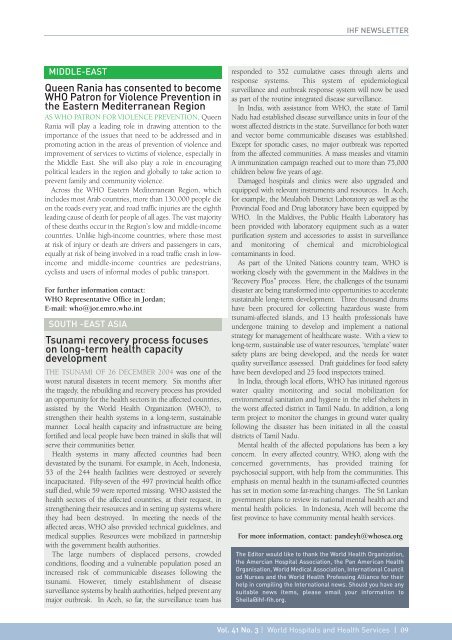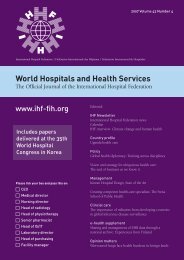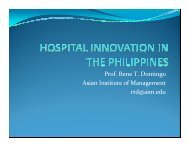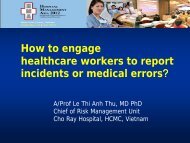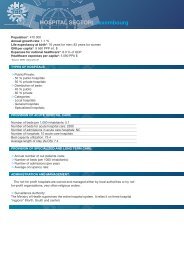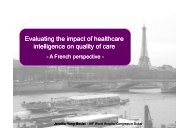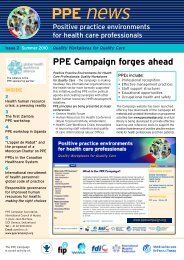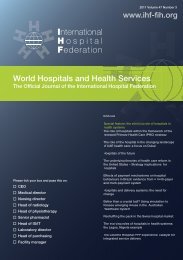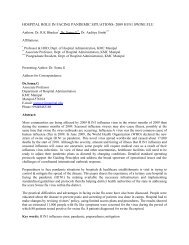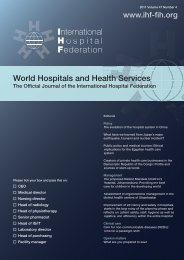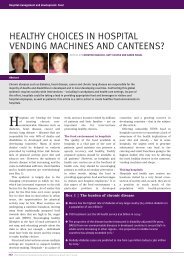World Hospitals and Health Services - International Hospital ...
World Hospitals and Health Services - International Hospital ...
World Hospitals and Health Services - International Hospital ...
You also want an ePaper? Increase the reach of your titles
YUMPU automatically turns print PDFs into web optimized ePapers that Google loves.
IHF NEWSLETTER<br />
MIDDLE-EAST<br />
Queen Rania has consented to become<br />
WHO Patron for Violence Prevention in<br />
the Eastern Mediterranean Region<br />
AS WHO PATRON FOR VIOLENCE PREVENTION, Queen<br />
Rania will play a leading role in drawing attention to the<br />
importance of the issues that need to be addressed <strong>and</strong> in<br />
promoting action in the areas of prevention of violence <strong>and</strong><br />
improvement of services to victims of violence, especially in<br />
the Middle East. She will also play a role in encouraging<br />
political leaders in the region <strong>and</strong> globally to take action to<br />
prevent family <strong>and</strong> community violence.<br />
Across the WHO Eastern Mediterranean Region, which<br />
includes most Arab countries, more than 130,000 people die<br />
on the roads every year, <strong>and</strong> road traffic injuries are the eighth<br />
leading cause of death for people of all ages. The vast majority<br />
of these deaths occur in the Region’s low <strong>and</strong> middle-income<br />
countries. Unlike high-income countries, where those most<br />
at risk of injury or death are drivers <strong>and</strong> passengers in cars,<br />
equally at risk of being involved in a road traffic crash in lowincome<br />
<strong>and</strong> middle-income countries are pedestrians,<br />
cyclists <strong>and</strong> users of informal modes of public transport.<br />
For further information contact:<br />
WHO Representative Office in Jordan;<br />
E-mail: who@jor.emro.who.int<br />
SOUTH -EAST ASIA<br />
Tsunami recovery process focuses<br />
on long-term health capacity<br />
development<br />
THE TSUNAMI OF 26 DECEMBER 2004 was one of the<br />
worst natural disasters in recent memory. Six months after<br />
the tragedy, the rebuilding <strong>and</strong> recovery process has provided<br />
an opportunity for the health sectors in the affected countries,<br />
assisted by the <strong>World</strong> <strong>Health</strong> Organization (WHO), to<br />
strengthen their health systems in a long-term, sustainable<br />
manner. Local health capacity <strong>and</strong> infrastructure are being<br />
fortified <strong>and</strong> local people have been trained in skills that will<br />
serve their communities better.<br />
<strong>Health</strong> systems in many affected countries had been<br />
devastated by the tsunami. For example, in Aceh, Indonesia,<br />
53 of the 244 health facilities were destroyed or severely<br />
incapacitated. Fifty-seven of the 497 provincial health office<br />
staff died, while 59 were reported missing. WHO assisted the<br />
health sectors of the affected countries, at their request, in<br />
strengthening their resources <strong>and</strong> in setting up systems where<br />
they had been destroyed. In meeting the needs of the<br />
affected areas, WHO also provided technical guidelines, <strong>and</strong><br />
medical supplies. Resources were mobilized in partnership<br />
with the government health authorities.<br />
The large numbers of displaced persons, crowded<br />
conditions, flooding <strong>and</strong> a vulnerable population posed an<br />
increased risk of communicable diseases following the<br />
tsunami. However, timely establishment of disease<br />
surveillance systems by health authorities, helped prevent any<br />
major outbreak. In Aceh, so far, the surveillance team has<br />
responded to 352 cumulative cases through alerts <strong>and</strong><br />
response systems. This system of epidemiological<br />
surveillance <strong>and</strong> outbreak response system will now be used<br />
as part of the routine integrated disease surveillance.<br />
In India, with assistance from WHO, the state of Tamil<br />
Nadu had established disease surveillance units in four of the<br />
worst affected districts in the state. Surveillance for both water<br />
<strong>and</strong> vector borne communicable diseases was established.<br />
Except for sporadic cases, no major outbreak was reported<br />
from the affected communities. A mass measles <strong>and</strong> vitamin<br />
A immunization campaign reached out to more than 75,000<br />
children below five years of age.<br />
Damaged hospitals <strong>and</strong> clinics were also upgraded <strong>and</strong><br />
equipped with relevant instruments <strong>and</strong> resources. In Aceh,<br />
for example, the Meulaboh District Laboratory as well as the<br />
Provincial Food <strong>and</strong> Drug laboratory have been equipped by<br />
WHO. In the Maldives, the Public <strong>Health</strong> Laboratory has<br />
been provided with laboratory equipment such as a water<br />
purification system <strong>and</strong> accessories to assist in surveillance<br />
<strong>and</strong> monitoring of chemical <strong>and</strong> microbiological<br />
contaminants in food.<br />
As part of the United Nations country team, WHO is<br />
working closely with the government in the Maldives in the<br />
‘Recovery Plus” process. Here, the challenges of the tsunami<br />
disaster are being transformed into opportunities to accelerate<br />
sustainable long-term development. Three thous<strong>and</strong> drums<br />
have been procured for collecting hazardous waste from<br />
tsunami-affected isl<strong>and</strong>s, <strong>and</strong> 13 health professionals have<br />
undergone training to develop <strong>and</strong> implement a national<br />
strategy for management of healthcare waste. With a view to<br />
long-term, sustainable use of water resources, ‘template’ water<br />
safety plans are being developed, <strong>and</strong> the needs for water<br />
quality surveillance assessed. Draft guidelines for food safety<br />
have been developed <strong>and</strong> 25 food inspectors trained.<br />
In India, through local efforts, WHO has initiated rigorous<br />
water quality monitoring <strong>and</strong> social mobilization for<br />
environmental sanitation <strong>and</strong> hygiene in the relief shelters in<br />
the worst affected district in Tamil Nadu. In addition, a long<br />
term project to monitor the changes in ground water quality<br />
following the disaster has been initiated in all the coastal<br />
districts of Tamil Nadu.<br />
Mental health of the affected populations has been a key<br />
concern. In every affected country, WHO, along with the<br />
concerned governments, has provided training for<br />
psychosocial support, with help from the communities. This<br />
emphasis on mental health in the tsunami-affected countries<br />
has set in motion some far-reaching changes. The Sri Lankan<br />
government plans to review its national mental health act <strong>and</strong><br />
mental health policies. In Indonesia, Aceh will become the<br />
first province to have community mental health services.<br />
For more information, contact: p<strong>and</strong>eyh@whosea.org<br />
The Editor would like to thank the <strong>World</strong> <strong>Health</strong> Organization,<br />
the Amercian <strong>Hospital</strong> Association, the Pan American <strong>Health</strong><br />
Organisation, <strong>World</strong> Medical Association, <strong>International</strong> Council<br />
od Nurses <strong>and</strong> the <strong>World</strong> <strong>Health</strong> Professing Alliance for their<br />
help in compiling the <strong>International</strong> news. Should you have any<br />
suitable news items, please email your information to<br />
Sheila@ihf-fih.org.<br />
Vol. 41 No. 3 | <strong>World</strong> <strong><strong>Hospital</strong>s</strong> <strong>and</strong> <strong>Health</strong> <strong>Services</strong> | 09


